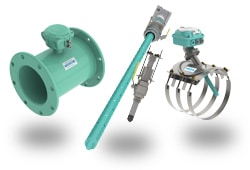
[vc_row row_type=”1″][vc_column][vc_single_image image=”13588″ img_size=”full” alignment=”center”][/vc_column][/vc_row][vc_row][vc_column][vc_empty_space][vc_custom_heading text=”Find Your McCrometer Electromagnetic Flow Meters” font_container=”tag:h1|text_align:center” google_fonts=”font_family:Roboto%20Condensed%3A300%2C300italic%2Cregular%2Citalic%2C700%2C700italic|font_style:700%20bold%20regular%3A700%3Anormal”][vc_empty_space height=”16px”][/vc_column][/vc_row][vc_row][vc_column][vc_custom_heading text=”Electromagnetic Flow Meters’ Products Information” font_container=”tag:h2|text_align:center” google_fonts=”font_family:Roboto%20Condensed%3A300%2C300italic%2Cregular%2Citalic%2C700%2C700italic|font_style:700%20bold%20regular%3A700%3Anormal”][vc_empty_space height=”16px”][vc_column_text]
What are Electromagnetic Flow Meters?
Electromagnetic flow meters, also called mag meters or magnetic meters, are volumetric flow meters that do not have any moving parts to wear, reducing the need for maintenance or replacement. Accuracy over a wide flow range can be as good as ± 0.5% of flow rate or better.
They feature an obstruction-free design that eliminates flow impediment and operates with electrodes embedded on opposite sides of the flow tube or sensor to pick up the signal. Mag meters perform extremely well in many municipal and processing applications and have become the meter of choice for measuring conductive liquids such as water or slurry.
How Does a Mag Flow Meter Work?
All mag meters operate under the principle of Faraday’s Law of Electromagnetic Induction to measure liquid velocity. The principle of operation states that a conductor moving through a magnetic field produces an electric signal within the conductor, which is directly proportional to the velocity of the water moving through the field. In essence, as fluid flows through the magnetic field, conductive particles in the fluid create changes in voltage across the magnetic field. This variation is used to measure and calculate the velocity of water flow through the pipe.
Advantages of using Electromagnetic Flow Meters
The main advantage of using mag-meter is that they require less maintenance, and can be ordered for very large line sizes. Some, such as McCrometer’s FPI Mag, for example, can be installed with a simple hot tap which does not require shutting down the line. Mag meters also have the benefit of adding a level of trust for consumers: they hold the service provider accountable for the actual water being produced and/or billed. These efforts will assist with the preservation of our water resources while improving profitability for the utility.
Disadvantages of using Magnetic Flow Meters
It depends on the meter itself. Some flow tube meters have a liner that can separate from the meter causing system damage and requiring maintenance. Look for a meter that does not require a liner, such as McCrometer’s Ultra Mag flanged magnetic meter with an NSF-approved, fusion-bonded epoxy liner: the UltraLiner. Mag meters don’t work on nonconductive fluids such as oils, steam, or gas.
Electromagnetic flow meters are typically the meter of choice when measuring a conductive liquid that is water-based, such as drinking water or wastewater, especially important when considering cost, accuracy, and longevity. You can be sure McCrometer has an ideal solution for your application.[/vc_column_text][/vc_column][/vc_row][vc_row][vc_column width=”1/6″][vc_single_image image=”13604″ img_size=”medium”][vc_custom_heading text=”FPI Mag” font_container=”tag:h3|font_size:10|text_align:center”][/vc_column][vc_column width=”1/6″][vc_single_image image=”14114″ img_size=”medium”][vc_custom_heading text=”McMag3000″ font_container=”tag:h3|font_size:10|text_align:center”][/vc_column][vc_column width=”1/6″][vc_single_image image=”14116″ img_size=”medium”][vc_custom_heading text=”SPI Mag” font_container=”tag:h3|font_size:10|text_align:center”][/vc_column][vc_column width=”1/6″][vc_single_image image=”14119″ img_size=”medium”][vc_custom_heading text=”Ultra Mag” font_container=”tag:h3|font_size:10|text_align:center”][/vc_column][vc_column width=”1/6″][vc_single_image image=”14122″ img_size=”medium”][vc_custom_heading text=”Dura Mag” font_container=”tag:h3|font_size:10|text_align:center”][/vc_column][vc_column width=”1/6″][vc_single_image image=”13800″ img_size=”medium”][vc_custom_heading text=”McMag2000″ font_container=”tag:h3|font_size:10|text_align:center”][/vc_column][/vc_row][vc_row][vc_column][vc_single_image image=”14125″ img_size=”full” alignment=”center”][/vc_column][/vc_row][vc_row][vc_column][vc_column_text]
Mag Meter FAQs
Our specialists and customer service team members are happy to answer any questions you may have. In the meantime, here are a few we answer a lot.
What industries are best suited for electromagnetic flow meters?
Magnetic flow meters can work in almost any water-based use case, but they provide special value in a few specific industries:
- Agriculture : Mag meters are a favorite in agriculture, especially for irrigation purposes. The fact that they include no moving parts means they work reliably in the field with no oversight or preventive maintenance needed.
- Wastewater : Where debris can hinder and damage other types of meters, electromagnetic meters actually require some sediment and particulates, making them ideal for wastewater solutions.
- Drinking water : Flow meters involved in municipal drinking water facilities need to earn NSF-61 certification to ensure their safety. Mag meters, like the Dura Mag and Ultra Mag flanged flow meters, can meet these requirements.
- Cooling water : Cooling towers require +0.5% accuracy, low-maintenance solutions. Electromagnetic meters can meet these requirements and can also be installed without interrupting service.
- Industrial : Electromagnetic meters are great for other industrial settings too, as they often qualify for Class 1, Division 2 classifications for hazardous areas.
What else do I need to know about electromagnetic flow meters?
It’s easy to see why mag meters are a lot of engineers’ favorite flow meters, but they’re not perfect for every setting. Electromagnetic meters are best suited for fluids with a conductivity that is 20 ohm/cm or higher. That means they’re not the best for:
- Low velocity applications
- Petroleum-based fluids, like oil
What is the accuracy of McCrometer mag meters?
Depending upon the product, it may vary. Our Ultra Mag and our FPI Mag offer up to ±0.5%. Our Dura Mag offers up to ±1%, and our SPI Mag, McMag 3000 and McMag 2000 offer up to ±2%. With extra calibration, the McMag 3000 can provide up to ±1% accuracy.[/vc_column_text][/vc_column][/vc_row]